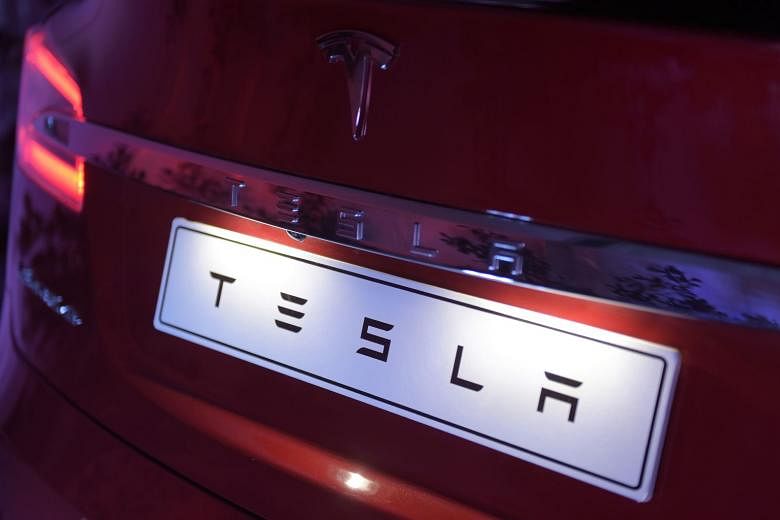NEW YORK (REUTERS) - US regulators are examining how Tesla chief executive Elon Musk announced his plan to take the electric carmaker private and whether his statement was truthful, the Wall Street Journal reported on Wednesday (Aug 8).
Musk announced his plan on Tuesday on Twitter, an unusual move that has drawn scrutiny from the US Securities and Exchange Commission (SEC), the newspaper said, citing people familiar with the matter.
The agency declined to comment and Tesla did not immediately respond to requests for comment.
Musk tweeted on Tuesday that he had secured funding for the plan, but he has not provided details or evidence, and several securities attorneys told Reuters that Musk could face investor lawsuits if it was proven he did not have secure financing at the time of his tweet.
Tesla's board on earlier on Wednesday said it was evaluating taking the company private, which would be the biggest leveraged buyout of all time.
In a statement on Tesla's website, six of Tesla's nine directors said the board had met several times over the last week to discuss such an idea and was "taking the appropriate next steps to evaluate this." Musk said that he was considering taking the loss-making electric carmaker private at US$420 a share, which would value a deal at more than US$70 billion (S$95 billion).
Tesla said on Wednesday the discussions had addressed the issue of how to fund such a deal, but gave no details. The statement did not address how the US$420-per-share price was established.
Public companies have four days to report certain material events that shareholders should know about to the US Securities and Exchange Commission.
Tesla shares fell 2.4 per cent to US$370.34 on Wednesday after closing up 11 per cent on Tuesday.
Some Wall Street analysts were sceptical of Musk's ability to gather the huge financial backing to complete such a deal, given that Tesla loses money, has US$10.9 billion of debt and its bonds are rated junk by credit ratings agencies.
"Who gives US$30 to US$50 billion to buy back the shares?" asked NordLB analyst Frank Schwope. "And if you stay as a shareholder you get less information than before and you depend more and more on Elon Musk."
The deal would be the biggest leveraged buyout of all time, beating the US$45 billion record set by Texas power utility Energy Future Holdings.
The most obvious equity partners for Musk would be a sovereign wealth fund such as Saudi Arabia's Public Investment Fund (PIF), which sources said on Tuesday had taken a stake of just below 5 per cent in Tesla, or a major technology investment fund such as SoftBank Group Corp's Vision Fund, bankers said.
SoftBank is currently not interested in a deal for Tesla after earlier this year taking a stake in General Motors' self-driving unit, Cruise, Reuters reported earlier on Wednesday.
Musk and SoftBank held unsuccessful talks about a take-private deal in April 2017, according to a source familiar with the matter. Bloomberg News, which first reported on that meeting, said the talks failed to progress due to disagreements over ownership.
China's Tencent Holdings, which took a 5 per cent stake in Tesla last year, could also be a possible partner.
SURPRISE MOVE
In a letter after his tweet on Tuesday, Musk fleshed out his idea, suggesting shareholders would get the option to sell their shares for $420 each or remain investors in a private Tesla, out of the glare of Wall Street and its need for positive quarterly results.
He said that would allow Tesla to "operate at its best, free from as much distraction and short-term thinking as possible." Some on Wall Street shared that view.
"They're being bombarded with questions that we don't think are as relevant to the long-term value of the company," said Sam Korus, an analyst for ARK Investment Management, which had 443,874 Tesla shares as of June 30. Korus said he would need more details from Musk to judge whether a buyout offer would be practical and at what price it would be attractive.
Musk has been under intense pressure this year to turn his money-losing, debt-laden company into a profitable higher-volume manufacturer, a prospect that has sent Tesla's valuation higher than that of GM.
The company is still working its way out of what Musk called "production hell" at its home factory in Fremont, California, where a series of manufacturing challenges delayed the ramp-up of production of its new Model 3 sedan, on which the company's profitability rests.
Going private is one way to avoid scrutiny by the public market as Musk and the company tackle those challenges. Musk has feuded publicly with regulators, critics, short sellers and reporters, and some analysts suggested that less transparency would be welcomed by Musk.
The six board members who issued the statement on Wednesday included James Murdoch, chief executive of Twenty-First Century Fox Inc and Brad Buss, who was the chief financial officer of solar panel maker SolarCity until it was bought by Tesla in 2016.
Other board members mentioned in the statement included Robyn Denholm, Ira Ehrenpreis, Antonio Gracias and Linda Johnson Rice. Tesla's other board members are Musk, his brother Kimbal Musk and venture capitalist Steve Jurvetson.

